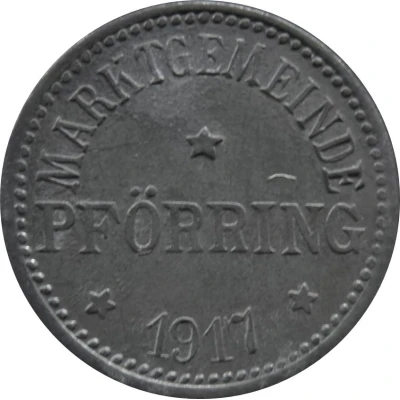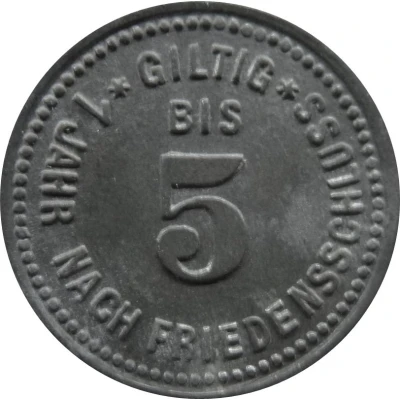


© Willem63 (CC BY-NC-SA)
5 Pfennigs - Pförring
1917 year| Zinc | 1.5 g | 18.0 mm |
| Issuer | Market Town of Pförring (Federal state of Bavaria) |
|---|---|
| Emperor | William II (Wilhelm II) (1888-1918) |
| Type | Standard circulation coin |
| Year | 1917 |
| Value | 5 Pfennigs (5 Pfennige) (0.05) |
| Currency | Mark (1914-1924) |
| Composition | Zinc |
| Weight | 1.5 g |
| Diameter | 18.0 mm |
| Thickness | 1.0 mm |
| Shape | Round |
| Technique | Milled |
| Orientation | Medal alignment ↑↑ |
| Demonetized | Yes |
| Updated | 2024-10-04 |
| Numista | N#317094 |
|---|---|
| Rarity index | 97% |
Reverse
Pearl rim, legend surrounding denomination.
Script: Latin
Lettering:
✶ GILTIG ✶
BIS
5
1 JAHR NACH FRIEDENSCHLUSS
Edge
Plain
Interesting fact
The 5 Pfennigs coin from Pförring, Bavaria, is interesting because it was issued during a time of economic turmoil in Germany, known as the "Inflationary Period" (1914-1923). During this time, the value of the German mark dropped significantly, and the government had to print more and more money to keep up with the increasing prices. As a result, many different types of coins were issued, including the 5 Pfennigs coin made of zinc, which was a cheaper alternative to other metals. Despite its low value, the coin is still a unique piece of history and a reminder of a challenging time in Germany's past.